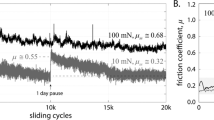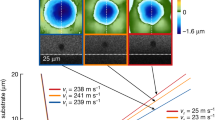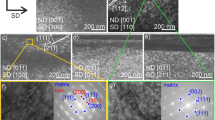Abstract
FOR the understanding of both boundary lubrication and the effect of environment on mechanical properties, it is important to know what increase, if any, occurs in the reactivity of metal surfaces when they undergo deformation. If an increase in reactivity greater than that due to changes in surface area is observed, it is reasonable to attribute it to the generation of point defects and dislocations in the metal. The relative importance of changes in surface area, point defects and dislocations is still largely speculative and an investigation is being made here to elucidate this.
This is a preview of subscription content, access via your institution
Access options
Subscribe to this journal
Receive 51 print issues and online access
$199.00 per year
only $3.90 per issue
Buy this article
- Purchase on Springer Link
- Instant access to full article PDF
Prices may be subject to local taxes which are calculated during checkout
Similar content being viewed by others
References
Uhara, I., et al., Nature, 192, 867 (1961).
Author information
Authors and Affiliations
Rights and permissions
About this article
Cite this article
CAMPBELL, R. Reactivity of Deformed Metal Surfaces. Nature 197, 374–375 (1963). https://doi.org/10.1038/197374a0
Issue Date:
DOI: https://doi.org/10.1038/197374a0
Comments
By submitting a comment you agree to abide by our Terms and Community Guidelines. If you find something abusive or that does not comply with our terms or guidelines please flag it as inappropriate.



